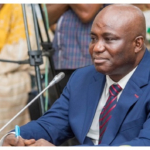
The Africa Sustainable Energy Centre (ASEC) has warned that Ghana’s rapidly declining crude oil production poses an immediate fiscal and economic threat, calling for urgent and strategic interventions to safeguard the country’s petroleum revenues and national energy security.
In a statement, ASEC said Ghana experienced a 56 per cent decline in petroleum revenue in the first half of 2025, a shock that could severely disrupt essential public expenditure and undermine macroeconomic stability if left unaddressed.
The Centre stressed that reversing the decline in oil production must be treated as a national priority.
ASEC outlined a series of recommendations aimed at halting the downward trend and restoring confidence in Ghana’s upstream petroleum sector.
According to the statement, the West Cape Three Points Block 2 (WCTP2) remains the most realistic short-term solution to boost output.
Estimated at 1.5 billion barrels of recoverable resources, WCTP2 is described as the only asset capable of producing significant incremental barrels between 2028 and 2032.
ASEC urged the government to expedite appraisal and development activities on the block to unlock badly-needed revenues.
The Centre also dismissed suggestions that Ghana’s Voltaian Basin could serve as a near-term economic lifeline. It noted that commercial production from the Basin is not feasible before 2033–2036, and must be treated as a long-term strategic asset, not a solution to current fiscal challenges.
ASEC further raised serious concerns about the conduct of the Ghana National Petroleum Corporation (GNPC), stating that the corporation has failed to remit $488.8 million in Explorco lifting proceeds to the Petroleum Holding Fund.
The statement described the situation as a breach of statutory obligations, especially given GNPC’s central role in reversing production decline. It also cited GH¢4.9 million spent on a golf clubhouse as evidence of weak financial discipline.
“These matters must be formally reviewed,” ASEC stated, arguing that the government should ensure full accountability before handing over any new exploration or production responsibilities to GNPC subsidiaries.
ASEC acknowledged recent announcements of $3.5 billion in new upstream sector investments, but cautioned that such spending is largely defensive, intended to slow the natural decline in existing mature fields, and will not trigger a major production boom.
The group insisted that the real growth opportunity lies in developing new high-impact assets such as WCTP2.
The Centre recommended that GNPC’s Explorco subsidiary lead operations on WCTP2, but warned the state against forcibly reclaiming Springfield E&P’s stake. Instead, it advised government to acquire Springfield’s interest to prevent costly international arbitration and avoid delays to production timelines.
Transparency, ASEC stressed, must be central to any acquisition. It urged authorities to ensure that all technical data required for assessment of WCTP2 is accessible, and that the independent technical and transactional advisory process remains free from “commercial or political bias” to protect Ghana’s national interests.
“The decline in crude oil production is no longer a distant concern. It is a present fiscal and economic threat,” the Centre stated, calling for decisive action, stronger governance controls, and reforms that prioritise long-term energy security.
ASEC concluded that Ghana stands at a crossroads and must immediately commit to developing WCTP2, restoring accountability within the national oil sector, and building the Voltaian Basin as a sustainable future pillar of petroleum growth.
- President Commissions 36.5 Million Dollars Hospital In The Tain District
- You Will Not Go Free For Killing An Hard Working MP – Akufo-Addo To MP’s Killer
- I Will Lead You To Victory – Ato Forson Assures NDC Supporters
Visit Our Social Media for More



